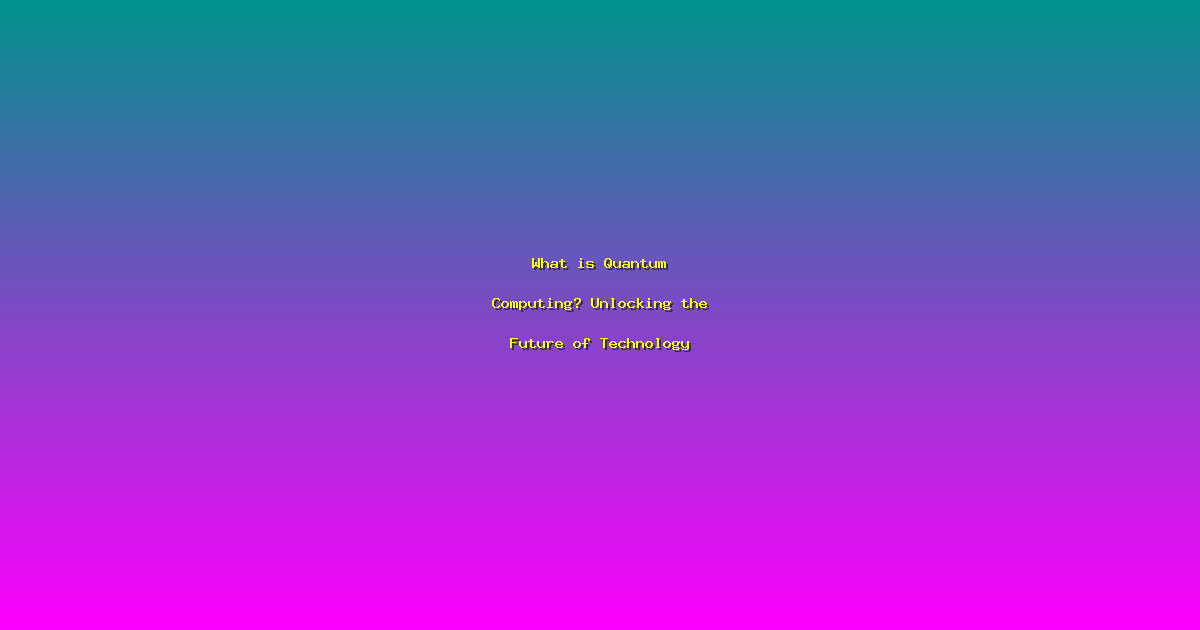What is Quantum Computing? Unlocking the Future of Technology
Quantum computing represents the next frontier in technological advancement, promising to solve problems that are currently beyond the capabilities of classical computers. This innovative technology harnesses the principles of quantum mechanics to perform complex computations at unprecedented speeds. In this article, we delve into the basics of quantum computing, its potential applications, and its impact on the future of technology.
The Basics of Quantum Computing
At its core, quantum computing leverages the unique properties of quantum mechanics such as superposition and entanglement to process information. Unlike classical computers that use bits (1s and 0s) for data processing, quantum computers use quantum bits, or qubits. These qubits can represent 1, 0, or both states simultaneously thanks to superposition, which allows quantum computers to process a vast number of possibilities in parallel.
Applications of Quantum Computing
The potential applications of quantum computing span various fields, including cryptography, drug discovery, financial modeling, artificial intelligence, and more. For instance, in cryptography, quantum computers could break existing encryption methods, necessitating the development of quantum-resistant algorithms. In drug discovery, quantum computing could accelerate the process of identifying potential pharmaceutical compounds by simulating molecular interactions at a quantum level.
The Challenges and Future of Quantum Computing
Despite its promising potential, quantum computing currently faces significant technical challenges. Quantum computers are highly sensitive to their environment, making errors a common occurrence. Additionally, the technology is still in its early stages of development, and building large-scale, reliable quantum computers is an ongoing challenge. However, with continued research and development, the future of quantum computing looks bright, promising to unlock new possibilities in science and technology.
Frequently Asked Questions
1. How does quantum computing differ from classical computing?
Quantum computing utilizes quantum mechanics to perform calculations, which allows it to process multiple states simultaneously, whereas classical computing processes one state at a time.
2. What are the practical applications of quantum computing?
Quantum computing can be applied to various fields such as cryptography, drug discovery, financial modeling, and artificial intelligence, among others.
3. Is quantum computing more powerful than classical computing?
Quantum computing has the potential to be more powerful than classical computing for certain types of problems, especially those that involve a large number of possible states or complex simulations.
4. What are the main challenges in developing quantum computers?
The main challenges include maintaining qubits’ coherence, reducing error rates, and scaling up the number of qubits to build more powerful quantum computers.
5. When can we expect quantum computers to be widely available?
While quantum computers are already in use in research and development settings, it may take years or even decades before they become widely available and practical for everyday use.
Conclusion and Call to Action
Quantum computing offers a glimpse into a future where computational power is no longer a limiting factor in solving complex problems. As this technology continues to evolve, it will undoubtedly play a pivotal role in advancing science, technology, and human knowledge. Keep an eye on the developments in this exciting field, and stay curious about the potential it holds to transform our world.

